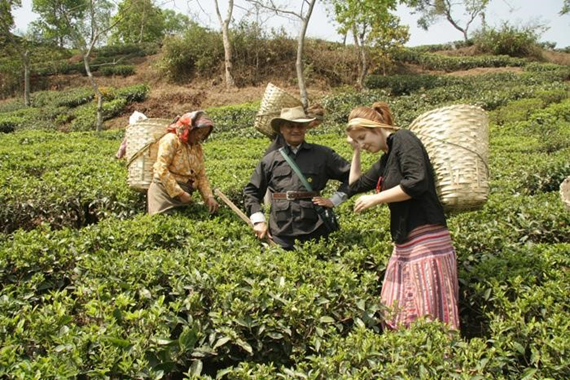Dr Parvani Rekhi
As a crossbreed concept combining the essentials of the tourism and agriculture industries, agritourism can be termed as a structure of special interest tourism, highlighting the distinctive travel experiences and activities that people can have in rural settings. Agritourism is a subsector of the tourism industry and a subset of rural tourism that uses a diverse array of farms as tourist destinations. It supports farm activities targeting tourists, including farm demonstrations, farm visits, farm training, etc., as well as on-site value-adding and sales of farm products. Agritourism occurs on a working farm or agricultural plant and is conducted for the visitors’ enjoyment and to generate supplemental income for farmers. Agritourism and nature tourism farms might include a diverse array of activities such as outdoor recreation, farming experiences, cultural entertainment, hospitality services, and on-farm direct sales.
The term agritourism has often been used alternatively with agrotourism, farm tourism, farm-based tourism, and rural tourism. It may be characterized as “rural enterprises which integrate both a working farm environment and a commercial tourism element. Farm enterprise diversification has become an approach for small farms to remain practical, particularly during high risks facing situations of modern-day farming. It includes different and integrated activities aiming to improve the environment and agricultural production, combines agriculture and forestation, and focuses on cultivating cash crops and improving soil quality and biodiversity, increasing the variety and quantity of farm products. With farmers becoming more market-oriented in response to declining farm incomes and rural restructuring, the reorientation of farming away from production to more entrepreneurial models of agriculture emerged. Thus, as diversification becomes an almost anticipated practice, farmers are being accepted as entrepreneurial, having to develop new skills and competencies to remain sustainable. This form of niche tourism has been considered as a growth industry in many parts of the world including India, Australia, Canada, the United States, and the Philippines. In India, the first idea of Agrotourism was operational in 2004 Baramati Agri Tourism Centre under the guidance of Pandurang Taware who received the National Tourism Award from the President of India, for the most innovative Tourism Product.
Need and Importance of Agro-tourism in India:
It is said that agro-tourism is a better way to know about the traditional agricultural farming activities which can bring us very close to mother-nature and also very essential thing for a sustainable living on this planet. Today, Indian cities are facing the problem of overcrowding and environment pollution. Now, it has become an assumed fact that agro-tourism can give us a relief from the hectic life of urban areas. That is why; agro-tourism, eco-tourism and rural tourism are emerging as key sectors of tourism business in India. The following reasons underlie the importance of Agro-tourism: It is a sustainable form of tourism business. It provides an additional source of income for the farmers. It gives prestige to rural life and creates new jobs at local levels. It gives an opportunity to urban tourists to escape from hectic life of the city. It enhances the quality of life for local residents. It gives the tourists glimpse of village ambience, local cuisine, culture and art. It expects the active involvement from the tourist, rather than a passive spectator, so a bond between guest-host is strengthened. It is eco-friendly which is very essential in the present environmental scenario. It makes tourists familiar with the rural life and roots of early civilization. It has a vast scope in the present scenario of tourism business in India. It is less expensive gateway of tourism and the cost of accommodation, food, travel and recreation is very less in Agro-Tourism when compared to any other type of tourism. It makes tourists familiar with rural games, traditional dresses, festivals and food.
Benefits of Agri-tourism
The potential benefits of agri-tourism development extend to farmers, rural communities, and tourism operators.
Benefits for Farmers: For farmers agri-tourism is a potential way of:
* Expanding farm operations;
* Using farm-based products in new and innovative ways;
* Improving farm revenue streams;
* Developing new consumer market niches;
* Increasing awareness of local agricultural products;
* Increasing appreciation of the importance of maintaining agricultural land;
* Channelling additional on-farm revenues directly to family members;
* Improving farm living conditions, working areas and farm recreation opportunities;
* Developing managerial skill and entrepreneurial spirit; and
* Increasing the long-term sustainability for farm businesses.
Benefits for Communities: From a community perspective, agri tourism can be a vehicle for:
* Generating additional revenue for local businesses and services from tourists;
* Upgrading / revitalizing community facilities for residents and visitors;
* Increasing protection of rural landscapes and natural environments for tourists and residents;
* Helping preserve and revitalize local traditions, art and craft;
* Promoting inter-regional, inter-cultural communication and understanding;
* Increasing awareness of agricultural issues and values among the public;
* Promoting the on-going use of local agricultural products and services;
* Helping to diversify & strengthen rural economy via job & income creation; and
* Providing a more energetic business environment for attracting other businesses and small industries.
Benefits for Tourism Operators: From a tourism industry view point, agri tourism can be a means of:
* Diversifying the mix of tourism products and services available to visitors;
* Increasing tourism flows into attractive rural regions;
* Increasing season length during traditionally off-peak business periods;
* Uniquely positioning rural regions in key tourism markets; and
* Bringing more non-local currency to local businesses.
Trending Now
E-Paper


